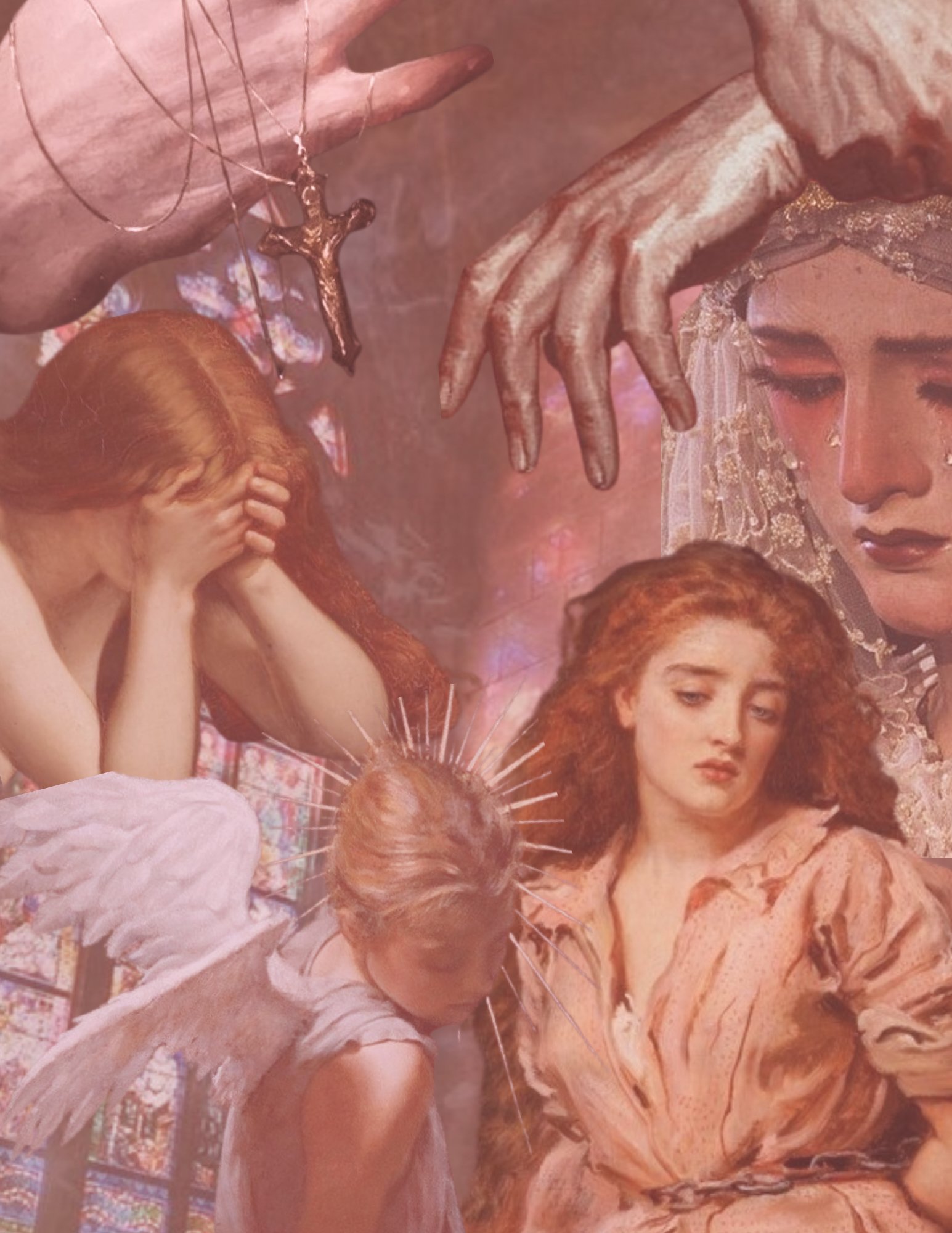My Martyr Complex
MY MARTYR COMPLEX
Written by Ayaana Nayak
Art by Isa Luzarraga
Someone once told me that rather than having a victim complex, I suffered with that of a martyr. The worst part about it was that I took pleasure in hearing that. My first thought wasn’t something logical like well, that’s a recipe for disaster, or how did I get to this point? Oh no, my first thoughts were yes, and? The thing is, martyrdom has been so excessively glorified that many of us have deluded ourselves into aspiring it. And for what, the chance that we’d be appreciated for it? I’ve learned, painstakingly, how that’s hardly a reason for doing something.
While the word martyr is traditionally associated with religion, it has grown to define any person with self-sacrificing tendencies for the benefit of others. A martyr complex stems from ideas similar to those related with people-pleasing. It describes a need for validation; a fulfillment derived from serving others at the cost of their own well-being.
To clarify, there’s nothing saintly about me. My version of self-sacrifice has more to do with people-pleasing; pushing myself to unsustainable limits to help someone else. For my friends, my family, wherever I was needed, really. I like knowing that I’m what’s making a positive difference in someone’s life. Maybe that’s just something I do to appease myself so that I believe that I’m a good person. Often, being “good” is associated with how much we do for others and less so about our loyalty to ourselves. When you stop looking at selfishness like the insult we’re taught it is, you’ll see how essential it is to our own well-being. I know this understanding seems rudimentary, but it’s taken me most of my life to really come to terms with it.
Naturally, I’ve found myself wondering where my need to martyr myself comes from. There’s a variety of reasons for it, many of which stem from the culture I grew up in. I was raised to believe you did anything to protect your own, but I think my definition of “own” got a little too superfluous. At the drop of a hat, I’d run to the assistance of anyone who asked for it, whether it was my teachers or peers. Often, I’d volunteer to stay back late and set up events that had nothing to do with me, all because no one else wanted to. Other times I’d give up hours of my time revising English papers with classmates I’d spoken to only a handful of times. I was a bit of a pushover if you can tell.
And then, of course, there were the stories. The stories I was raised on—the ones I consumed with the hunger of adolescent escapism. They were books and TV shows that fed me tales of heroes and versions of bravery that required sacrificing themselves for the people they loved. Sometimes for the whole world. When you put it into context, their decision to give themselves up makes sense. But how does something like that manifest subconsciously, especially in children?
One of my favorite shows growing up was Avatar: The Last Airbender and its sequel series, The Legend of Korra. I watched both of them incessantly in an effort to get as close to their stories as I could. In the third season of The Legend of Korra, the titular Avatar was willing to sacrifice herself to protect a race of people. It wasn’t the first time, either.
The sequel series has always been the more heartbreaking one, for everything Korra was put through. We saw her broken over and over again, and each time she faced it willingly because it was her responsibility. What sticks with me is that she was just a girl who had done painfully little for herself without suffering consequences. She was miserable, but she was loved by thousands. At the ripe age of 12, I thought yeah, that’s worth it. I saw her misery as something that was acceptable. What’s worse is that I saw it as something to aspire to. It’s probably why I glorified any suffering I endured. I thought it made me special, made me a better person. On some level I probably even sought it out so I could convince myself I was deserving of appreciation.
The trope that Avatar plays with is that of the “chosen one.” The concept itself is a psychotic break waiting to happen. What are the chances that any of us truly bear the burden of protecting a civilization? I’m wagering on never. And yet, we secretly await the day we will. Most of us were waiting for Hogwarts letters on our eleventh birthday. Better yet, we were waiting for Hagrid to tear through our front doors to give our lives some greater meaning.
One of the beautiful things about stories is that they make us feel like we can be more. Simultaneously, they run the risk of putting pressure on us to be more. I grew up harboring a secret hope that I would stumble upon some great purpose and find meaning in it. I wanted something like destiny to be handed to me so I wouldn’t have to seek one out for myself. It would have required far more commitment than I’m prone to. The truth, unsatisfying as it may be, is that the greatest meaning in our lives will likely be derived from the things we do for ourselves.

